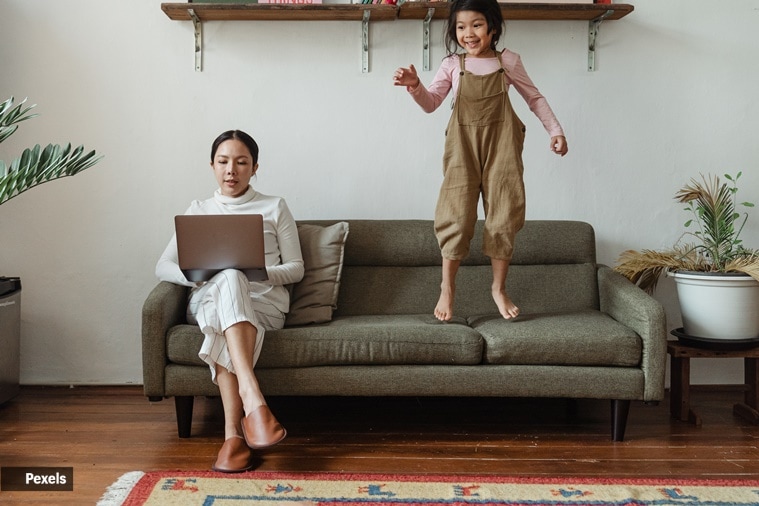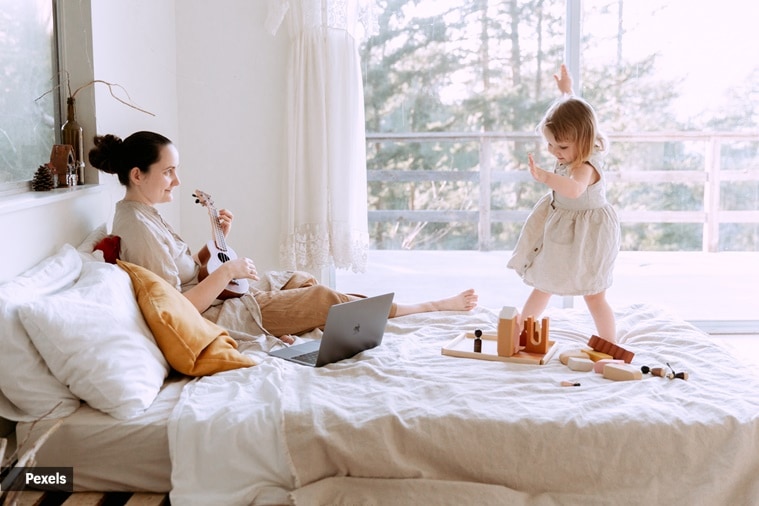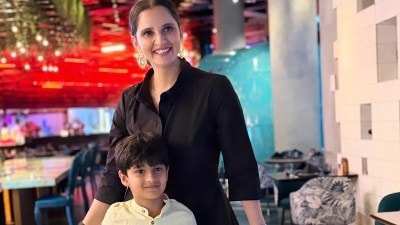Flexible parenting: All you need to know
"Flexibility in parenting does not indicate that we should always give in to all our kids' whims and demands"
 Read on to know why flexible parenting approach is also known as 'backbone parenting'. (Source: Representative image/Pexels)
Read on to know why flexible parenting approach is also known as 'backbone parenting'. (Source: Representative image/Pexels)By Asha Vaghasia
Parents are usually advised to remain consistent so that their children know what to expect. While predictability is helpful to children, it also might promote a sense of rigidity and control.
Flexibility, on the other hand, includes always being open to new possibilities, viewing situations from multiple points of view, and taking steps in a manner that considers the needs of everyone involved, not just the child or parents.
The flexible parenting approach is also known as the backbone parenting approach. It is flexible but also firm just like a spine. In this style of parenting, more and more responsibilities and power are given to kids as they grow up and develop skills, and emotional maturity.
Inflexible clearly defined boundaries, expectations, and regulations change as the children become mature. When boundaries are breached, natural or logical outcomes are granted rather than punishments.
Feelings are respected, and the relationship between parents and children is crucially important. Research has repeatedly shown that this parenting style has extremely positive outcomes for children. Children are valued, understood, and secured in their place in the world as they grow up.
In other words, they grow up to be secure and confident. They’re less likely to struggle with anxieties and depression and go the wrong way in teenage. (drugs and other addictive substances)
Flexibility does wonders in parenting!
 Remain flexible when it comes to dealing with difficult situations. (Source: Representative image/Pexels)
Remain flexible when it comes to dealing with difficult situations. (Source: Representative image/Pexels)
When our child’s behaviour is unacceptable, or when our child says something we don’t agree with, or when our child insists on doing certain things from their perspective, there are two possible outcomes as parents — we might either dig our heels in and fight to be right… OR we may pause for a moment, take a breath, gain a better understanding, and develop flexibility. The latter never takes place in most parenting cases.
Flexibility in parenting does not indicate that we should always give in to all our kids’ whims and demands. It’s more about giving and taking – like a swing, it can’t be pulled too far in one way without letting it go! But if you work together, you can do a lot more!
When it comes to parenting, we generally let fear take charge, and fear leads to controlling all that we can. There is a lot of stress and disagreements as a result of the fear and intimidation. This cycle is usually driven by a lack of belief in our children’s abilities, an unwillingness to explore other options, auto-pilot parenting, and our refusal to be flexible.
Consistency may very well be soothing as it gives us a sense of certainty and stability. The truth is, if we add some flexibility to that consistency, we gain not just predictability, but also harmony, settle our anxieties, pleasure, and the ability to understand and potentially satisfy everyone’s needs.
How can we include flexibility in our daily routine?
 Learn to accept your child’s feelings. (Source: Representative image/Pexels)
Learn to accept your child’s feelings. (Source: Representative image/Pexels)
There are so many tiny little things that we must let go of and a few new learnings/tricks to adapt.
*Involve your kid in all small and big decisions. Listen to their point of view and try to understand their perspective.
*Do not get stuck with musts and should all the time. If something is not working for you, don’t be afraid to let go of it.
*Switching/ interchanging roles as parents are of utmost need. (e.g.: If one parent is strict for something, only they don’t need to be strict for the same thing always. And if one parent is strict with something, others have to be soft and liberal. Balance is important.
*Keep faith in your child and let them do certain things their way even if they don’t turn out to be well or how you wished it to come out.
*Plan an extra time-out with your child now and then so that the special moments and bonds you share don’t get lost in the chaos of your daily routine.
*When you need their help in any of your tasks, ask them instead of demanding them.
*Learn to accept your child’s feelings. However, may they feel, don’t squash their feelings by saying it’s wrong to feel a certain way.
*Dare to bring a difference in ways of doing tasks/ things, it will bring humour and help you relax and let go.
*Don’t say NO rudely, say as kindly as you can and explain the logic behind you saying no.
*Finally, take care of yourself. If you won’t take care of yourself and love yourself, you won’t be able to do it for others.
*We must be conscious enough to be open-minded and adaptive to learn and to be flexible. A huge part of flexible or backbone parenting is just trying to be intentional about what you’re doing most of the time instead of being reactive and punishing or scolding.
*Flexibility is not an easy thing – for sure – it is not going to be easy to be consistent but it’s one of those things that is good to be aware of and keep in practice all the time – especially if we want our kids to be flexible and for you to be relaxed and calm as they grow up.
(The author is Founder and Parenting Coach at We Positive Parenting, Ahmedabad)
For all the latest Parenting News, download Indian Express App.
- 01
- 02
- 03
- 04
- 05






























